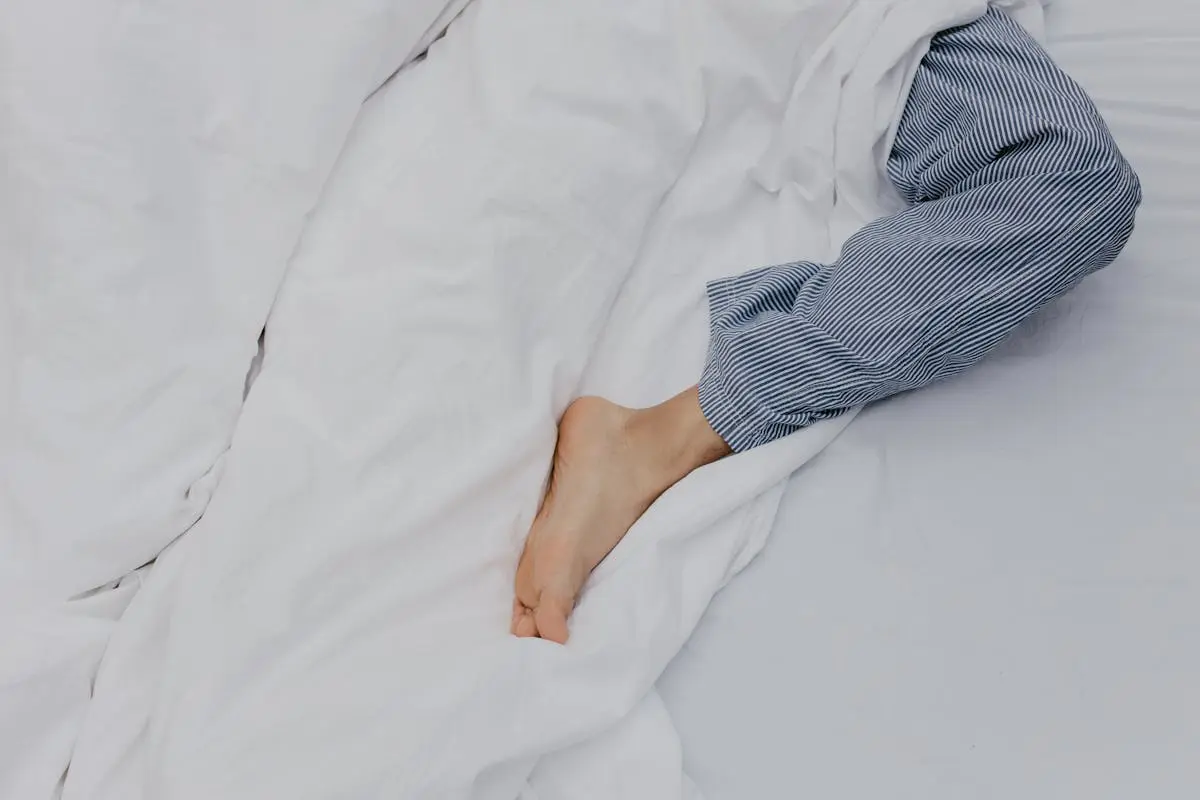Leg cramps during sleep can be an unexpected nuisance, disrupting your rest and leaving you puzzled the next day. Let’s explore the reasons behind these mysterious nighttime cramps and how you can find relief.
What Are Leg Cramps?
Leg cramps are sudden involuntary muscle contractions most commonly impacting the calves. They can strike during the day but are notorious for flaring up at night.
During sleep, you might suddenly awaken to find your calf muscles painfully tightened and hard to the touch. This unexpected spasm can be startling and, sometimes, severely painful. These spasms, or muscle contractions, happen when your muscles shorten tightly and suddenly without your control.
While the exact cause of these cramps remains elusive, many experts suggest that factors like muscle fatigue and nerve dysfunction are at play. The result is often a night of disrupted sleep and a sore calf the following day.
Common Causes of Leg Cramps at Night
Nighttime leg cramps are mysterious but may be linked to several factors. Muscle fatigue is one commonly cited cause, likely due to overuse or strain earlier in the day.
Interestingly, a sedentary lifestyle might also contribute, as prolonged sitting can lead to muscle tightening. It’s not just active people who suffer; a lack of movement can leave your muscles unprepared for their sudden nighttime job.
Another consideration is nerve dysfunction. Overactive nerves can send signals to muscles to contract, leading to these involuntary spasms during sleep. This hypothesis aligns with findings associating nighttime cramps with conditions like peripheral neuropathy and vascular diseases.
Moreover, factors like dehydration and an imbalance in electrolytes are often considered culprits. Although more research is needed, ensuring adequate hydration and a balanced diet might help maintain proper muscle function and reduce cramping incidents.
How to Prevent Leg Cramps During Sleep
Preventing leg cramps at night often begins with simple lifestyle adjustments. Stretching before bed can ease muscle tightness and may help keep cramps at bay. Focus on your calves and hamstring stretches to maintain flexibility and readiness for the restful hours ahead.
Staying hydrated is another powerful tool in your prevention arsenal. Keeping your body well-hydrated ensures your muscles function properly and can significantly decrease your chances of experiencing those painful nocturnal cramps.
Additionally, a balanced diet rich in key minerals like magnesium and potassium can aid in muscle health. These nutrients are integral to muscle function, so incorporating foods like bananas, nuts, and leafy greens can be beneficial.
Establish a consistent bedtime routine that promotes muscle relaxation. Techniques like warm baths, massage, or light yoga can soothe your muscles before you hit the sack—and who doesn’t love a serene bedtime ritual?
When to Seek Medical Advice
While most leg cramps are just a benign inconvenience, there are times when medical advice is warranted. If your cramps become frequent, severe, or are accompanied by swelling or changes in skin color, it might be time to consult with a healthcare provider.
Persistent leg cramps could be a signal of underlying conditions like peripheral vascular disease or other complex medical issues. A doctor can provide valuable insights and help tailor a treatment regime that’s suitable for your specific needs.
By seeking medical advice, you can obtain a clear diagnosis and possibly alleviate the worry of more serious conditions, allowing you to focus on resolutions rather than stressors.
Rest Assured: Manage Night Leg Cramps Effectively
Understanding the causes of night leg cramps and adopting preventive measures can lead to more peaceful nights. Gradual lifestyle changes, keeping hydrated, and being mindful of your daily habits play vital roles in minimizing these disturbances.

